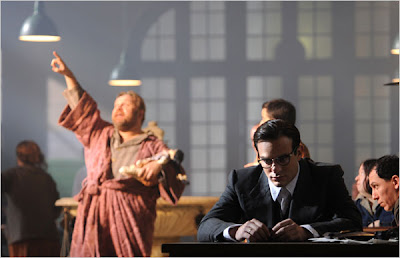 One of the more colorful — and controversial — stories of the modern Church is being made into a movie.
One of the more colorful — and controversial — stories of the modern Church is being made into a movie.
It’s the story of the founder of Opus Dei — which figured prominently, of course, in that little movie made by Ron Howard a couple years back.
Let the debates begin.
From the New York Times:
The film director Roland Joffé, who has yet to regain the acclaim he won a generation ago for “The Killing Fields” and “The Mission,” is shooting a movie in Argentina focused on the founder of Opus Dei, an elite and powerful organization within the Roman Catholic Church.
The film, “There Be Dragons,” set during the Spanish Civil War, weaves fictional characters created by Mr. Joffé with the story of St. Josemaría Escrivá de Balaguer, the Spaniard who founded Opus Dei and was canonized by the church.
The project was initiated by a member of Opus Dei, is partly produced and financed by the group’s members and has enlisted an Opus Dei priest to consult on the set. News of the project has set off criticism among some former Opus Dei members that the movie will be little more than propaganda for the organization. But Mr. Joffé, in the first interview he has given about the film, said that he had been given complete creative control and that Opus Dei never had any influence on the project.
He ditched the script he was originally given, he said, because he did not want to make what he called a “biopic” about Escrivá’s life. But, he added, he was intrigued by Escrivá’s ideas about the power of forgiveness and the capacity of every human being for sainthood. Opus Dei — the name is Latin for work of God — teaches that ordinary work can be a path to sanctity if the believer maintains a demanding regimen of religious practices intended to achieve holiness.
“I was very interested in the idea of embarking on a piece of work that took religion seriously on its own terms and didn’t play a game where one approached religion denying its validity,” Mr. Joffé said.
When pressed, he called himself a “wobbly agnostic” but added, “I do believe that rigid atheism is a rather intellectually short-sighted position.”
The Opus Dei members behind the project were delighted to enlist Mr. Joffé, whose reputation was that of a political leftist who made films that asked profound ethical questions.
In the 1980s Mr. Joffé was nominated for Academy Awards as best director for “The Killing Fields,” about the genocidal war in Cambodia, and “The Mission,” about Jesuit missionaries who try to defend a South American tribe from Portuguese slave traders. But his career has sputtered since, with movies like “The Scarlet Letter” and “Captivity,” a horror movie, earning him nominations for the Golden Raspberry Awards, which honor the worst of the film industry.
Mr. Joffé’s portrayal of Escrivá’s actions during the 1930s is likely to be provocative, especially in Europe. Some historians have accused Escrivá of collaborating with Franco. Mr. Joffé said he concluded after doing extensive research that Escrivá had been eager to avoid doing anything that would jeopardize the church’s position in Spain.
“Josemaría himself left Spain, and basically stayed out, and my sense is that he didn’t agree with and didn’t want to get involved in politics at the time,” he said.
You can read more at the Times link.
PHOTO: Charlie Cox, foreground, as the Rev. Josemaría Escrivá de Balaguer, who founded Opus Dei in the 1920s and once took refuge in a mental hospital, in a scene from “There Be Dragons.” Photo by Michael Lichtenstein.
